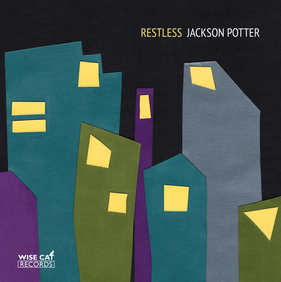
Larsen says, “This album started as a COVID-19 escape. A way to keep playing music, even as live performance was not possible. As the world began to open, I was able to play these pieces in public and learn more about how I wanted to present them. The compositions are taken from the last four years of my life, earning my doctoral degree and getting more exposure to jazz composers from a variety of eras and genres.”
And it shows. All of the pieces are originals from Larsen and they do honor to the influences that are so clearly and cleanly heard.
Joining Larsen in the project are Brendan McMurphy on trumpet, flugelhorn and drums, Kate Skinner and Danny McCollin on piano and keyboards, Josh Skinner and Nick Isherwood on bass, with Greg Yasinitsky on tenor and baritone saxophones for tracks 1 and 9 and Ken Peplowski on clarinet for track 3.
The album opens with A New Thing Comin’ with that great pairing of saxes with Larsen and Yasinitsky. Kate Skinner adds a fine touch to the keyboards (and gets a cool solo) and Josh Skinner and Brendan McMurphy make the rhythm section swing. I was hooked from the first track.
Then Smoke Screen switches the line-up with McCollin on keyboards and Nick Isherwood on bass. Plus, McMurphy jumps aboard with smoking flugelhorn to complement Larsen’s sax who absolutely puts you on the edge of your seat with that throaty sax. Love it.
Augmented Reality turns in a Big Band feel with its big swing and catchy melody. Larsen’s sax trades with Peplowski’s clarinet and results are excellent. Then Family turns into something of a ballad with its emotional imagery. McCollin’s electric piano is delicate and deliberate. And oh, that tenor sax of Larsen. Gorgeous and warm as family.
Speaking of tenor saxes, He Who Getz the Last Laugh is obviously a nod-and-a-wink to the great Stan Getz and it works. Kate Skinner nails the piano solo. Oscar Peterson would be proud. What an excellent piece this is. The homage is there but it is also so original. Then See You at 8 pushes us in another direction and you are reminded of just how versatile Larsen really is. Into the Light is a beauty with a lovely melody and excellent drum work from McMurphy who is always understated but always, always spot on. Add to that McMurphy’s horn and you’ve got the makin’s.
Into the Mild is another sweet swing and Larsen works his magic so well. Kate Skinner is fantastic on the piano and Josh Skinner adds his great bass. Notice how the Skinners are on the same tracks? And that chemistry is also something to enjoy. This just might be my favorite track.
The album concludes with Tensai (天才), the Japanese word for genius. It is a fitting description for the work done on this song from Larsen and Yasinitsky on the saxes to the Skinners to McMurphy. Good God, ya’ll. Okay, this one was my favorite. It is just how you want an album to end…by not wanting it to end.
Deviate from Standards works on every level from the performances to the compositions to even the track arrangement. This is an album that immediately makes you hit the replay button. Over and over.
~Travis Rogers, Jr. is The Jazz Owl



 RSS Feed
RSS Feed
